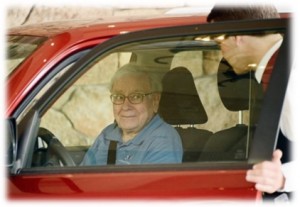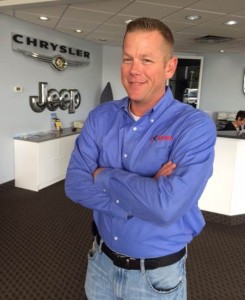I know what I don’t know. And when it comes to industry investment, a good gauge is none other than “The Oracle of Omaha” Warren Buffett. While news of radio swaps and purchases is all over our industry trades, on the bigger stage, Buffett made news last week.
His company, Berkshire Hathaway, passed on all the radio stations on the market, and instead, just bought Van Tuyl Group, the country’s largest, privately held chain of car dealerships. Obviously, there are synergies for Geico in this purchase – imagine being able to take care of your car insurance needs when you’re cutting the deal to buy or lease a new vehicle.
But it goes well beyond that because a deeper look at Berkshire Hathaway’s new purchase supports Buffett’s love of industries that come with “moats” – that means barriers to entry that can hold off competitors in a space.
 Car dealerships are also the main interface between the auto industry and the public. As we’ve learned over the past few years in our work with Ford and our organization of DASH, local dealerships have taken on renewed importance. It’s not just about getting their media dollars. Dealerships in every rated market in America are an important key for broadcast radio, because that is where new car buyers go to get their questions answered and to learn how to use their new “digital dashboards.”
Car dealerships are also the main interface between the auto industry and the public. As we’ve learned over the past few years in our work with Ford and our organization of DASH, local dealerships have taken on renewed importance. It’s not just about getting their media dollars. Dealerships in every rated market in America are an important key for broadcast radio, because that is where new car buyers go to get their questions answered and to learn how to use their new “digital dashboards.”
As we approach DASH next week, it occurs to me that our idealized concept of an industry consortium to interface with the automakers may have been too early on the curve. We envisioned the leadership of radio’s biggest broadcasting companies in cooperation with their counterparts in the industry’s trade organizations coming together to meet and partner with the auto industry’s C-suite denizens. CEOs talking to CEOs about the future of their respective businesses.
Given the many challenges, initiatives, and distractions facing the radio industry – digital competition, music royalties, HD radio, NextRadio, flat revenue growth, Nielsen – the “connected car” issue is often met with a shrug because most people don’t know where to begin.
So maybe the time isn’t right for a “top-down approach for radio to take with the auto industry. And that’s why we are shifting our focus to the same sector that is obviously appealing to Warren Buffett – car dealerships – a “bottom-down” approach that starts at the local level.
Like the essence of the radio industry, these businesses are local, community-minded, and dependent on basic interaction with the general public in order to generate sales and good feelings.
We believe that this is the opportunity for radio companies and stations – big and small – working in concert with state broadcaster associations who know the local turf like no other.
At DASH last year, one of the most popular – and eye-opening sessions – was our car dealer panel. Attendees were treated to honest, straight-forward talk from Michigan-based business leaders who talked about the changing ways they are marketing their dealerships.
This year, we’re going a step further by highlighting dealers in a session that will go right to the heart of the challenges and opportunities. Long-time radio star turned automotive ad agency chief, Lee Alan Reicheld, will remind DASH-goers about the power of the creative message.
Then it’s a panel discussion among radio managers and local dealers that will drill down into what should matter most to broadcasters – the actual moment when a consumer picks up their new car or truck. How they are taught by dealership trainers is the essence of radio’s challenge and also its opportunity.
 That’s because the way in which radio can hold (or even grow) its cume moving forward in the #1 listening location – the car – may come down to this guy pictured at left. You’ve never met him, read about him in our industry trade, or seen him at a radio convention. But he may be the most important linchpin in the process that protects your cume in the car. His name is Jeff Wilson and he’s a trainer at Extreme Dodge/Chrysler Jeep in Jackson, Michigan. Jeff walks car buyers through their shiny new vehicles, showing them how the UConnect dashboard electronics work.
That’s because the way in which radio can hold (or even grow) its cume moving forward in the #1 listening location – the car – may come down to this guy pictured at left. You’ve never met him, read about him in our industry trade, or seen him at a radio convention. But he may be the most important linchpin in the process that protects your cume in the car. His name is Jeff Wilson and he’s a trainer at Extreme Dodge/Chrysler Jeep in Jackson, Michigan. Jeff walks car buyers through their shiny new vehicles, showing them how the UConnect dashboard electronics work.
He’s the guy who has the power to draw the customer’s attention to the AM/FM radio section of the “center stack,” he can show them how they can preset their favorite stations, and he is a big determinant of where radio ends up in the hierarchy of what they see on their dashboard screens when they start their vehicles each and every day. Or not.
If Jeff doesn’t mention AM/FM radio, and doesn’t demonstrate how to set the presets, or extolls the virtues of satellite radio and other options consumers can access from their smartphones, then it’s all too easy for the customer’s audio experience to shift away from broadcast and instead, gravitate to what Larry Rosin referred to last year at DASH as the “barrage of new.”
We know from focus groups and from what automotive experts tell us that most consumers learn the basics of their systems, set them up, and then rarely – if ever – go back to reset or change their choices. What occurs during these training sessions is of paramount importance to radio because they impact the life of the customer’s experience with their car.
At DASH, we’re showing video of the training process – what really happens when car buyers pick up their vehicles, and is introduced to the digital dashboard via the trainer at the local dealership. You’ll hear the questions customers ask, and how trainers answer them.
If radio is to protect its so-called 93%, it will not come from just employing the usual games and gimmicks, like direct mail, billboards, and concert ticket giveaways. It will come down to basic blocking and tackling at the grassroots level, with local stations and state broadcaster associations working together to interface with each and every dealership in the metro.
That’s a major agenda item we’re going to talk about next week at DASH – devising solutions that attendees can take back to their stations and begin implementing.
The key here is that radio has an opportunity to impact these inflection points – whether the new car buyer becomes a positive or a negative for broadcast radio, your company, and your station.
Someone mentioned to me last week that while DASH is a positive event for the radio industry and he wishes he could join us next week in Detroit, it may be a little too early on the technology curve for a conference like this because “connected cars” are a few years away from reaching a tipping point.
Actually, I hope DASH isn’t too late.
You can register for DASH here.
- What To Do If Your Radio Station Goes Through A Midlife Crisis - April 25, 2025
- A 2020 Lesson?It Could All Be Gone In A Flash - April 24, 2025
- How AI Can Give Radio Personalities More…PERSONALITY - April 23, 2025




Understanding mistakes of yesterday makes the difference between thriving and barely surviving.
We all watched radio industry leaders ignore the oncoming digital train. Many people threw warning-after-warning that this day of dashboard judgement was coming. All were ostracized as heretics.
The automotive industry plans a decade in advance. If it starts now, before the radio industry gets back to where its execs believe radio would always be inside vehicles – as a primary audio choice – how much more listener erosion will occur?
I know you’re doing your best with DASH but too many people leading radio still believe their in-car habits reflect the general population, and/or that radio is already heavily involved in “digital.” They could not be more wrong.
This is the dashboard of a Tesla. Try and find anything related to broadcast radio on it – https://audiographics.com/misc/tesla_dashboard.htm
If you believe “…that’s only in the high-end cars,” look at the Ford Sync’s dashboard, and find the same absence of radio – https://bit.ly/Z9DtEi
By not attending DASH, anyone in the decision making chain of radio will be making the same mistake we’ve seen over the past 15 years. By 2020, you’ll end up fighting for advertising pennies.
Appreciate the comments, Ken, as always. Thanks for taking the time.
If car dealerships are locally owned, then what is Buffett buying?
An honest question. I’m not sure I get it. Doesn’t public ownership change the nature of the business and its community-responsiveness?
Becca, not all car dealerships are part of large syndicates or franchise networks. And what would stop the RAB, broadcast groups, or an industry consortium from cutting deals with large dealer groups of companies like Buffett’s? The point is that the “action” with the center stack is being established at the dealership level. While iBiquity may be talking directly with OEMs and Tier 1s, other industry groups can partner with local dealers or groups. Thanks for writing.